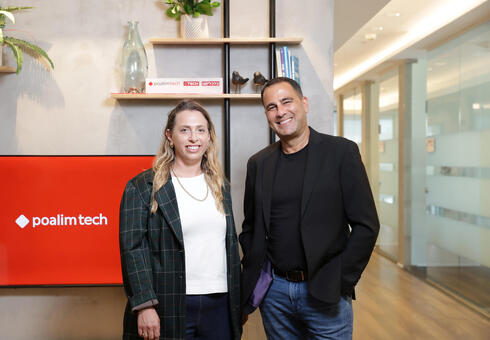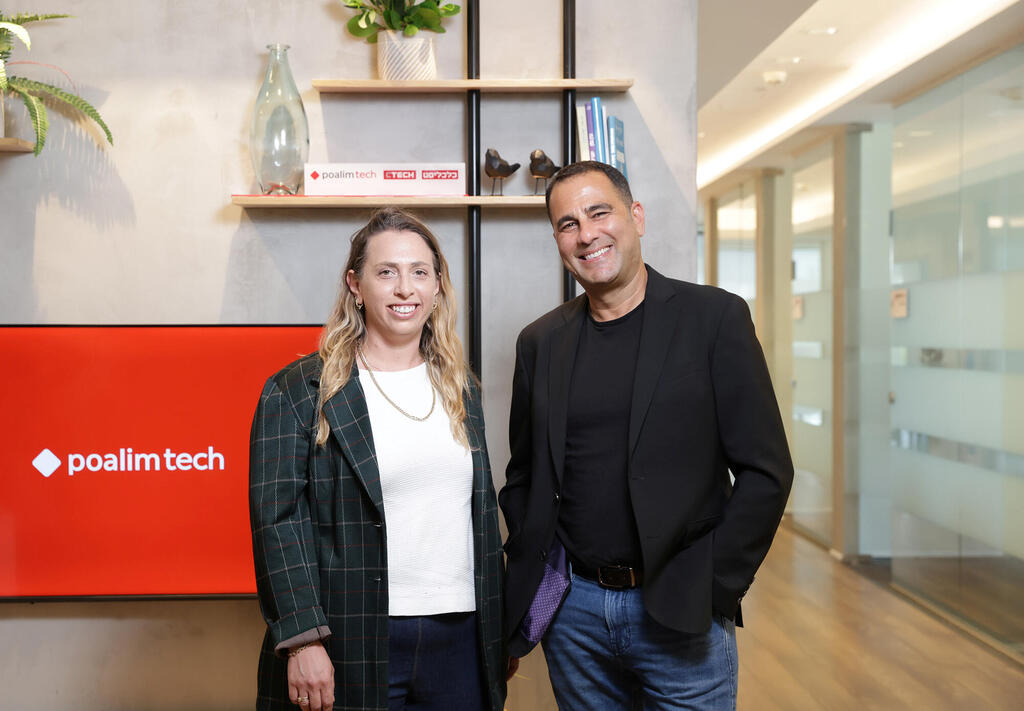
“Too many young companies are looking to scale business before their product wins technologically”
As part of the Calcalist and Poalim Tech mentoring project Growth+, JFrog's CEO Shlomi Ben Haim and Citrusx's CEO Noa Srebrnik explore the intricacies of overcoming entrepreneurial challenges and the resilience necessary to succeed
In a candid dialogue, JFrog's CEO Shlomi Ben Haim and Citrusx's CEO Noa Srebrnik explore the intricacies of overcoming entrepreneurial challenges and the resilience necessary to succeed in Israel's competitive high-tech industry. The conversation was held as part of the Growth+ project of Calcalist and Poalim Tech involving a series of 1:1 meetings between experienced entrepreneurs and early-stage start-up companies, with the goal of providing advice, support, and knowledge on entrepreneurship, creativity, managing start-ups, and building companies for growth.
1 View gallery


JFrog's CEO Shlomi Ben Haim (right) and Citrusx's CEO Noa Srebrnik.
(Photo: Orel Cohen)
Shlomi, tell me about a crisis you encountered at the beginning and what you learned from it that can help young entrepreneurs.
"One of the most challenging things, certainly in this period, is raising the initial funding. It's a challenge that puts you to the test in front of a mirror, and it's not certain that you like what you see after being told 'no' a hundred times. But in this, companies grow resilience and DNA. From 2008 to 2012 we met with funds all over the world and no one agreed to invest in JFrog. We reached the point where we raised the A round when we already had 200 customers. In many places, the entrepreneur begins to ask himself if he is doing something wrong, if the product is not interesting, if there is no market for it. But you also have to remember that if you manage to survive such a period, it provides you with a lot of resources for the rest of the way - which is more difficult. I'm not happy about this period, but JFrog is better because of it."
Noa, what is the biggest difficulty you encountered this year?
"We were in the process of signing an agreement with a large bank and then October 7th happened. The bank wanted to wait and see that we survived. It took a month for them to see that everything was back and that we were functioning before we signed the contract. It delayed us but there is no doubt that in the end, we succeeded, we proved ourselves, and moved on."
Shlomi, what did you advise on this matter?
"Noa is focused and building an excellent company. However, I meet far too many young entrepreneurs that the investors and the board push to prioritize Go to Market before their product is technologically mature enough. Many times I hear young companies say that they need to recruit senior salespeople, that they need to reach scale. And then I ask, 'What do you want to happen tomorrow?' Make sure that the product is ready, fully developed, and unequivocally different from the competition, and only after that, you will go and spend millions of dollars on recruiting expensive salespeople. Your funds will not like what I say, but too many young companies are looking to scale business before their product wins technologically and then you hear stories that they do not manage to raise the next round."
What did you learn from each other?
Shlomi: "I have three daughters and when I was preparing for the meeting, I read Noa's statement about why she became CEO and she wrote, 'This is the ultimate fulfillment,' which is basically saying, 'I am responsible for my destiny.' You can be very senior in all kinds of places, but as she said, 'It's better to be a glorious failure as long as I tried,' and for me this shows she’s an amazing lesson."
Noa: "I've learned that it's hard work, we have to continue to believe in our uniqueness and our ability to distill all things in order to grow and grow in the hope of reaching successes like JFrog's."
Tell us about something interesting you discovered about each other.
Noa: "I learned that even though Shlomi's daughters grew up abroad, they decided to come and serve in the army. When I think of moving abroad, I'm afraid to cut my children off from here, but this is proof that both are possible."
Shlomi: "It was amazing to see how much Noa perceives and writes down and her head still filters what she will do and what she won't do. Israel is very dependent on the success of Israeli high-tech and entrepreneurs like her are the next generation."
Michal Kissos Hertzog, CEO of Poalim Tech, concluded:
"As an entrepreneur, you often think you know the challenge you're facing, but many times the real challenge is hidden behind the scenes. Every company faces common and unique challenges. One way to identify a company's unique challenge is to hear as many stories as possible from other companies and how they faced challenges. That’s why we created this project. The goal is to inspire, stimulate thinking, and perhaps most importantly, to trigger the magical element that every entrepreneur wishes for: intuition. Intuition comes after we have heard, processed, and digested countless stories and experiences, both our own and others’."













